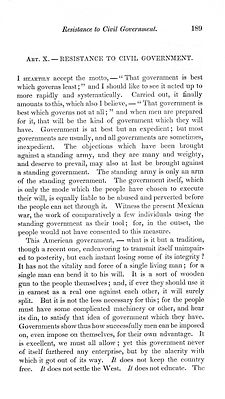La desobediència civil
La desobediència civil (Civil Disobedience) és un assaig de l'escriptor i filòsof anarquista estatunidenc Henry David Thoreau publicat l'any 1849. L'assaig planteja la desobediència civil davant les mesures injustes de l'Estat. L'autor fou molt crític davant l'esclavitud dels negres i la guerra dels Estats Units i Mèxic.
| Resistance to Civil Government i Civil Disobedience | |
|---|---|
|
La desobediència civil (1849) | |
| Projectes germans | |
|
| |
|
| |
| Dades generals | |
| Autor | Henry David Thoreau |
| Publicació | 1849 |
Citacions
modifica- Accepto amb entusiasme el lema: «El millor govern és el que menys governa».[1]
- (en anglès) I heartily acceptthe motto — "That government is best which governs least".
- El govern és una oportunitat; però la majoria dels governs normalment, i tots els governs a vegades, són inoportuns.[1]
- (en anglès) Government is at best but an expedient; but most governments are usually, and all governments are sometimes, inexpedient.
- (en anglès) When it is most expedient, the governed are most let alone by it.
- Deixa que cada home faci saber quin tipus de govern inspiraria el seu respecte, i aquest serà un pas per tal d'aconseguir-lo.[1]
- (en anglès) Let every man make known what kind of government would command his respect, and that will be one step toward obtaining it.
- (en anglès) A government in which the majority rule in all cases cannot be based on justice.
- La llei mai ha fet els homes una mica més justos i, mitjançant el seu respecte per la llei, fins i tot els que tenen bones intencions, diàriament són qualificats com a agents de la injustícia.[1]
- (en anglès) Law never made men a whit more just; and, by means of their respect for it, even the well-disposed are daily made the agents of injustice.
- El que s'entrega completament als seus pròxims, se'l pren com un inútil i un egoista; el que només s'hi entrega parcialment, se'l considera un benefactor i un filantrop[1]
- (en anglès) He who gives himself entirely to his fellow-men appears to them useless and selfish; but he who gives himself partially to them is pronounced a benefactor and philanthropist.
- Tots els homes reconeixen el dret a la revolució; és a dir, el dret a rebutjar la lleialtat al govern i a oposar-s'hi quan la seva tirania o la seva ineficiència siguin greus i insuportables.[1]
- (en anglès) All men recognize the right of revolution; that is, the right to refuse allegiance to, and to resist, the government, when its tyranny or its inefficiency are great and unendurable.
- El soldat que es nega a servir en una guerra injusta és aplaudit per aquells que no es neguen a mantenir el govern injust que impulsa la guerra.[1]
- (en anglès) The soldier is applauded who refuses to serve in an unjust war by those who do not refuse to sustain the unjust government which makes the war.
- L'error més gran i prevalent requereix la virtut més desinteressada per tal de mantenir-lo.[1]
- (en anglès) The soldier is applauded who refuses to serve in an unjust war by those who do not refuse to sustain the unjust government which makes the war.
- Sota un govern que empresona algú injustament, el lloc adequat per a un home just també és la presó.[1]
- (en anglès) Under a government which imprisons any unjustly, the true place for a just man is also a prison.
- (en anglès) The rich man is always sold to the institution which makes him rich.
- El millor que pot fer un home per la seva cultura quan és ric és esforçar-se a dur a terme aquells projectes que considerava quan era pobre.[1]
- (en anglès) The best thing a man can do for his culture when he is rich is to endeavor to carry out those schemes which he entertained when he was poor
- Si un home pensa amb llibertat, somia amb llibertat, imagina amb llibertat, mai li semblarà que és allò que no és, i els governants o els reformadors poc sensats no el podran aturar.[1]
- (en anglès) If a man is thought-free, fancy-free, imagination-free, that which is not never for a long time appearing to be to him, unwise rulers or reformers cannot fatally interrupt him.
- La veritat sempre està amb harmonia amb ella mateixa, i no està interessada principalment a revelar la justícia que pot estar constituïda per la maldat.[1]
- (en anglès) Truth is always in harmony with herself, and is not concerned chiefly to reveal the justice that may consist with wrong-doing.
- Mai hi haurà un Estat realment lliure i progressista fins que l'Estat no reconegui l'individu com el poder més alt i independent, del qual derivi tot el seu propi poder i autoritat, i el tracti en conseqüència.[1]
- (en anglès) There will never be a really free and enlightened State until the State comes to recognize the individual as a higher and independent power, from which all its own power and authority are derived, and treats him accordingly.
Referències
modificaBibliografia
modifica- Thoreau, Henry David. La Desobediència civil. Cànoves i Samalús: Proteus, 2012. ISBN 9788415549574.
- Thoreau, Henry David. On the Duty of Civil Disobedience. Project Gutenberg, 1993.
- «Civil Disobedience». Ames, Iowa: Iowa State University, cop. 1999-2009. Arxivat de l'original el 1372960646. [Consulta: 3 juliol 2013].
